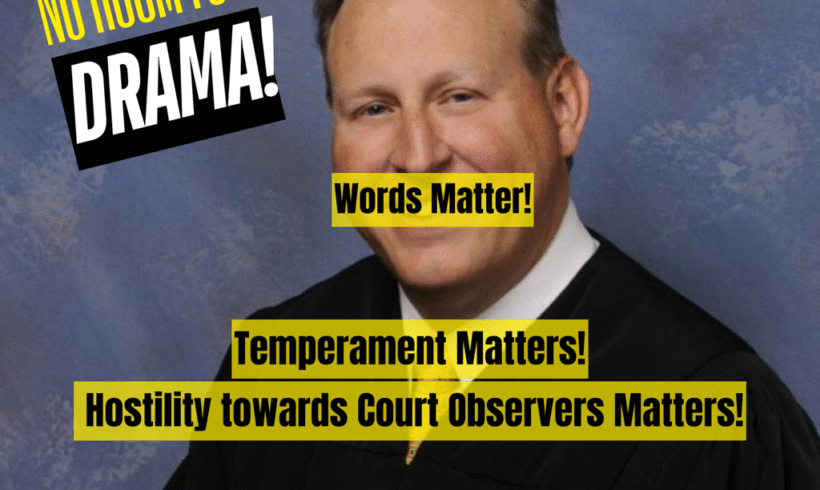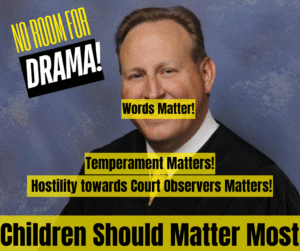Clark County, Nevada
October 28, 2025
🎥 Watch: BRYCE DUCKWORTH FAMILY COURT JUDGE STORMS OFF THE BENCH
In a system where the stakes are nothing less than children’s futures, parental rights, and the livelihoods of two very anxious adults, the role of a Family Court judge demands calm, fairness, clarity — and an unwavering respect for process.
Yet in Department Q of the Eighth Judicial District Court (Family Division) in Clark County, where Judge Bryce C. Duckworth presides, serious questions have emerged about whether these critical benchmarks are being met.
1. A Judge with Commendations — and Yet, Unanswered Concerns:
Judge Duckworth’s biography reflects a distinguished legal career: a family-law practitioner turned judge, elevated to the bench in 2008, and serving his current term through January 4, 2027.
Yet reputation and résumé alone don’t answer deeper concerns: What happens when the courtroom atmosphere becomes volatile? What happens when litigants feel unheard, intimidated, or sidelined? There are credible reports suggesting that this is the environment in Judge Duckworth’s courtroom.
2. The “Intimidation” Complaint and Transparency Roadblocks:
In 2017, Judge Duckworth recused himself from a family court matter after issuing an order accusing Veterans In Politics International President Steve Sanson of attempting to “influence and intimidate” the court.
According to the order, Judge Duckworth documented a series of off-record communications (text messages and phone calls) in which Mr. Sanson allegedly questioned why an attorney in a pending case “gets away with so much ‘crap,’” attempting to engage the judge in dialogue. The judge’s reaction was to frame those communications as a threat to judicial independence — and to treat the observer as a hostile actor.
This raises critical issues:
-
One: The boundary between legitimate oversight and improper influence is delicate — but a judge branding a non-litigant court observer as a threat injects tension into what should be an open judicial process.
-
Two: When a court already operates under an air of secrecy (Family Courts often appear sealed and observers are frequently blocked), such incidents heighten concerns about how easily transparency is dismissed.
-
Three: While Judge Duckworth may defend his actions, the optics of recusal based on perceived pressure signal a loss of control — or at least a perception that control was lost.
For parents, self-represented litigants, and community observers, the message is troubling: if a judge feels threatened by a citizen’s questions, how secure is the role of a neutral arbiter?
3. Temperament and the Myth of Impartiality:
Although specific, publicly documented “walk-off” incidents by Judge Duckworth are limited, litigants and observers allege he has stormed off the bench mid-hearing or abruptly recessed without clear notice. The credibility of these claims varies, but even anecdotal reports should raise concern.
Why? Because in Family Court, every minute counts. A parent waits to speak — to be heard. A child’s access may hinge on a single ruling. When a judge leaves the bench in frustration or appears emotionally unmoored, it doesn’t just pause the hearing — it erodes faith in the process.
In a past interview, Judge Duckworth acknowledged, “I’ve often said and I’ve often heard that we’re dealing with good people at the worst moments of their life.” That is a noble sentiment — but it also underscores the emotional volatility of the courtroom. When a judge recognizes the toll yet allows it to shape his conduct, that duality becomes dangerous. It’s the fine line between empathy and volatility.
4. The Appearance of Bias and the Perception of Control:
Even if a judge is technically impartial, the appearance of bias is just as damaging. In the incident involving Mr. Sanson, Judge Duckworth’s framing of oversight as “outside influence” created an adversarial tone between the bench and those who come before it.
This posture:
-
Discourages critique, observation, and public oversight — all essential components of judicial accountability.
-
Can subtly affect outcomes, not through evidence, but through the comfort level of the litigants in that courtroom environment.
-
Makes appeals harder: when a litigant senses animus or bias, challenging a judge’s ruling becomes an uphill battle.
For families already in crisis, these aren’t abstract concerns — they determine whether justice feels accessible or impossible.
5. Systemic Weaknesses in the Family Court Context:
Judge Duckworth presides over one of the highest-volume courtrooms in Nevada. A 2019 Nevada Supreme Court report noted that while the Clark County Family Court “is doing most things well,” persistent deficits remain — especially regarding feedback to judges and public confidence.
A key finding: “There isn’t a really good feedback loop to judges to improve how they do what they do.”
When a high-stakes, emotionally charged environment combines with limited oversight, heavy caseloads, and a judge accused of harsh conduct, the result is a fragile system where public trust can easily fracture.
6. Why This Matters — to You, Your Family, and Your Vote:
-
If you or someone you love may ever appear in Clark County Family Court, understanding who the judge is — not just by résumé, but by temperament and courtroom culture — matters.
-
If the judge seems unprepared, volatile, or dismissive, your chance at a fair hearing shrinks.
-
Judges run for retention or re-election — and you have a say. High retention scores don’t guarantee a positive courtroom experience.
-
In moments of personal crisis — divorce, custody, protective orders — the judge defines the balance between fairness and fear.
7. Recommendations for Action:
-
Observe Courtroom Behavior: Attend hearings in Department Q. Note whether proceedings start on time, whether litigants are treated respectfully, and whether hearings are cut short or disrupted.
-
Document Problems: If you witness a litigant being ignored, interrupted, or if the judge abruptly leaves the bench, document the date, context, and exact wording. Objective detail matters.
-
Use Formal Channels: If you believe a judge’s conduct violates procedural fairness or the Nevada Code of Judicial Conduct, file a complaint with the Nevada Commission on Judicial Discipline.
-
Educate Your Network: Many parents don’t know which judge they’ll face or what that judge’s record looks like. Share reliable information.
-
Vote With Knowledge: If Judge Duckworth appears on a ballot, don’t vote on name recognition alone. Seek independent evaluations, watch hearings, and review complaints.
Final Word:
Judge Bryce C. Duckworth walks a difficult path — presiding over cases where nearly everything is emotional, complex, and time-sensitive. His professional record includes achievements and commendations.
But when courtroom culture tilts toward intimidation, when observers are labeled as threats, and when transparency falters, the harm extends far beyond any single litigant. It undermines confidence in the very system meant to protect families.
If you live in Clark County, this matters. Your vote, your voice, and your willingness to observe and demand fairness matter. Because when the robe becomes part of the drama instead of a symbol of justice — the families sitting in that courtroom are the ones who suffer.









